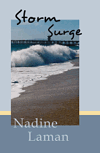I chuckle at the industry news that says the publishing industry is changing, needs to change, or the really funny ones about the look of publishing in the future - as if
they know the future.
First off, the industry - as any other - is changing daily. Glyn Pope mentioned in the comments the other day about a book he was reading from the 1930's and how the writing style was different from now.
Besides writing styles, the technology is ever evolving. From a better ink for the monks to use to today's digital presence, we are always looking for a better way to publish books.
When I get an ms to read the first thing I notice is the formatting. I don't know how searchable it is on this blog, but learn about formatting - it is paramount. (There are posts that cover this on somewhere in First Draft.)
Over the years, I've received some real ms messes and spent months working with the writer to get their ms in shape to query a literary agent.
With Cactus Rain, I won't do that - there isn't the time. The mss have to arrive in good shape -- in writing and formatting, and the correct file type.
It is extremely important to understand how to use your software (MS Word is practically the industry standard - because it used to come installed on new computers so everyone had it for free).
With a typewriter, which some of us began with, what you saw was what you got. While the results and some of the procedure are (or can be) the same with a computer, the difference is the dynamic language of the CPU.
Because computers 'think' in a binomially language from the DOS-prompt years, (I'm sure you know, but it is a two 'letter' language for the computer that is two numbers, one and zero, often grouped in multiples of eight digits), it does not 'think' like a typewriter. Right, a typewriter does
not think. "BINGO!"
A computer computes in its one's-and-zero's-mind with a 'language' called codes - you've heard of coding for websites - yes? What you see may not be what you get. Remember the time something looked fine on the screen and printed out differently - e.g., badly?
Tabbing to center something isn't the same thing (to the computer) as using the center code command to position the text. One of the biggest mistakes people make is to use the 'enter' key like the typewriter's return to get to the start of a new page.
The problem with that during editing is, if enough words are added or deleted to change the number of lines in the chapter, it will move up or down the following lines (in the next chapter). That is why it is REQUIRED to use the 'page break' command at the end of each chapter. Note that I wrote REQUIRED. Please don't forget to number the pages.
After putting the ms in basic format, such as chapters starting on a new page and double spaced line, then I am ready to read. I add paragraph and scene breaks as I read as well as turning on track changes for the comments and suggestions I make - which is basic content editing.
In the years I've been doing this for people (for free), I've seen some of them grow as writers and a few who won't take any direction from anyone, who then self-publish a book they aren't happy with in the end.
A couple of months ago someone suggested that I download a free software that is almost like Word. (Are you kidding me?) Why would I want to put extra software on my computer? I
bought MS Word and Corell WordPerfect - the
wantabe writer needs to provide their ms in the correct software file. Don't go all diva before it is time.
Buy the correct software to be a real writer - your competition will, every year thousands of writers do this stuff correctly and get published.Please don't send mss to me to content edit. I don't have the time. Once I announce that I'm accepting unsolicited mss, feel free to send a query in the usual, industry standard manner.
While I don't do formula writing, there is a 'formula' or industry standard to getting a book from the first draft to the published book. Research my blog and other sources of information and learn how to do it right, so you succeed in your dream to be a published author.
 When my grandfather said someone was the "Salt of the Earth" it was a sincere compliment. I'm pretty sure saying something is the "Meat and Potatoes" of it, is also from that era.
When my grandfather said someone was the "Salt of the Earth" it was a sincere compliment. I'm pretty sure saying something is the "Meat and Potatoes" of it, is also from that era.

 When Paul Fenton stops for breakfast in a small town, he gets more than he bargained for in the process.
When Paul Fenton stops for breakfast in a small town, he gets more than he bargained for in the process.
 When two-hundred-year-old human remains are discovered on one of Neptune's moons, Earth's history falls into question.
When two-hundred-year-old human remains are discovered on one of Neptune's moons, Earth's history falls into question.
 Emily's husband persuades her to try thalidomide to ease her symptoms as she is unaware of the devastating effects.
Emily's husband persuades her to try thalidomide to ease her symptoms as she is unaware of the devastating effects.
 Who is the women's shelter bomber? Melissa Ryan suspects that her husband knows.
Who is the women's shelter bomber? Melissa Ryan suspects that her husband knows.
 Further developments with the Wilder family.
Further developments with the Wilder family.
 A hidden past shakes the O'Donovan family to its core
A hidden past shakes the O'Donovan family to its core
 A swirl of emotion and choice, set in Cape Town, South Africa
A swirl of emotion and choice, set in Cape Town, South Africa
 Love is a constant, but it comes at a price.
Love is a constant, but it comes at a price.
 When the road ahead is unclear, sometimes you have to rely on trust.
When the road ahead is unclear, sometimes you have to rely on trust.
 The struggle between good and evil is ages old. It gets all the more complicated when the good guys aren't all good and the bad guys have redeeming qualities.
The struggle between good and evil is ages old. It gets all the more complicated when the good guys aren't all good and the bad guys have redeeming qualities.
 Story of a land mothering two races of people – the light-skinned and the dark-skinned.
Story of a land mothering two races of people – the light-skinned and the dark-skinned.
 A gifted Ukrainian ballerina comes into possession of a mysteriously coded address book.
A gifted Ukrainian ballerina comes into possession of a mysteriously coded address book.
 Six passengers' lives change for better or worse after they arrive in Honiton.
Six passengers' lives change for better or worse after they arrive in Honiton.
 Resilience and love in a harsh and unforgiving age
Resilience and love in a harsh and unforgiving age
 Kathryn's Beach
Kathryn's Beach High Tide
High Tide Storm Surge
Storm Surge